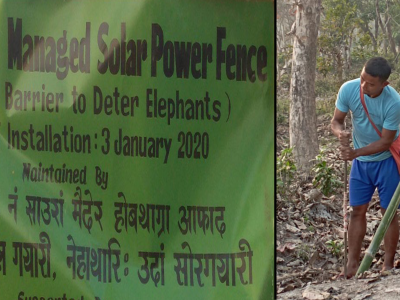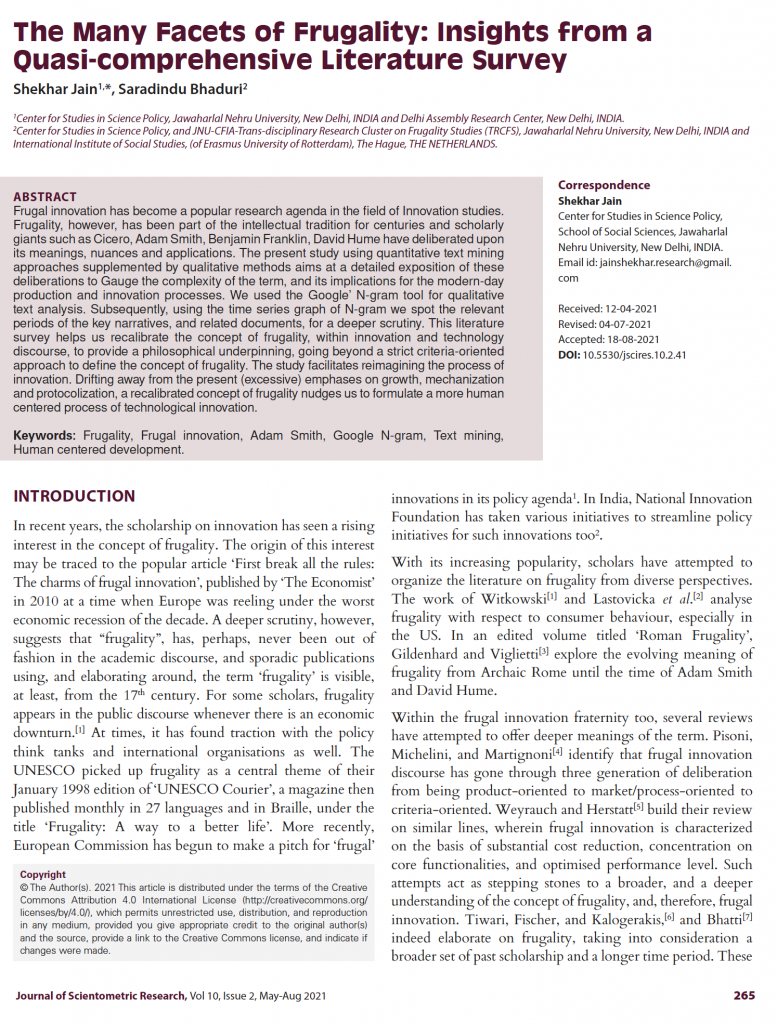FRUGALITY IN INNOVATION GOVERNANCE: LEARNING FROM THE POLYCENTRIC HUMAN-ANIMAL CONFLICT GOVERNANCE
Project Duration: 2 years
January 2021-December 2022
Lead Researchers: Dr. Manish Kumar Shrivastava and Dr. Saradindu Bhaduri
The question of decentralization and scale is central to many policy debates in the context of governance for sustainable development. Many argue that decentralization (localization) of solutions, grounded in community-based practices and local resource management, local partnerships as well as technologies suited for local needs and constraints are critical in dealing with sustainability challenges This line of reasoning is best articulated in the context of managing common property resources recognizing the multiplicity of scales and difference in actors and stakeholders and their autonomies, the landscape of localization of innovations in a multi-level governance context is captured by the concept of polycentric governance.
The proposition of localized, small scale solutions is largely ignored by many asserting the grandeur of sustainability challenge and the probable impossibility of the small-scale solutions adding up to the scale at which interventions are needed The recent literature on polycentricity, especially in the context of climate change, however, has recognized the importance of bottom-up innovations in governance where non-nation states actors across countries exercise their authority and autonomy to come up with feasible solutions and partnerships (Bernstein and Hoffmann 2018). Yet, the role of national governments, particularly in developing country contexts in facilitating, encouraging, and to a great extent institutionalizing localization of policy and technological solutions has also been underlined.
Frugality, broadly understood as innovations and experiments by marginal actors emerging out of local contexts and constraints (cultural, economic, resource, political, capabilities, etc.) , and framings of problems, and motivations influencing solutions, is in need of rigorous conceptualization in a multi-level, multi-scaler and multi-actor policy and innovation context. Such a conceptualization is necessary to elevate the discourse of frugality from an empirical category to theoretical argument capable of providing not only a comprehensive critique of large-technological systems based and top-down expert knowledge driven inequitable and unsustainable development paradigm, but also offering insights for further democratization of innovations in the fields of economic growth and development, technological change, governance, resource management, organization of markets, and overall democracy itself. The important question to explore, hence, would be:
- Is frugality bounded to small scale or it can acquire conceptually consistent but different meanings at different levels of governance and scales of operation?
- If frugality can be defined across levels and scales, how does its conception at a higher level and scale facilitates its conception at a lower level and scale, and vice-versa?
- If frugality cannot be defined across levels and scales, and indeed is bounded to small scale, what are the ethical and institutional challenges in reconciling possible conflict between frugality of bottom-up spontaneity and top-down homogenising institutions of modernity?
- What are the implications of answers to above questions for the pursuit of sustainable development and emerging polycentricity of governance?
In order to better frame and answer the above questions, the study will examine biodiversity conservation governance in the North-East Region of India. Due to difficult geographical terrain, and smaller size of various administrative units, the region has significant opportunities for small scale, participatory interventions towards sustainable development and climate proofing of development. Many international and national agency driven programmes targeting smaller groups of communities, along with civil society organizations are being implemented in the region. This study will focus on documenting the diversity of action, projects, programs, and actors and aim to determine the degree of presence of frugality in such a polycentric governance landscape, and its role: whether it is the dominant form of governance, or it is a necessary supplement to the top-down multi-level governance, or it functions as autonomous localized form of addressing local problems.
The dominant discourse on biodiversity conservation (fauna as well as flora) insists on keeping the protected areas insulated from human activity. The technologies of conservation therefore put a lot of emphasis on separation (e.g. fencing) and monitoring (patrolling, surveys) technologies. In case of wildlife conservation monitoring also includes that of endangered species (e.g. use of tracking devices). An alternative discourse, emphasising on co-existence of humans and natural life, insists that the human-nature conflict can be best resolved by recognising the specific dependence of one on the other and seeing humans as part of the nature. This argument is strongest in the cases of indigenous communities living inside and around the protected areas. Such an approach can potentially expand the scope of innovation in governance and technologies of conservation incorporating traditional knowledge and practices related to fauna and flora, for example traditional methods of distancing (such as animal calls or pug marks as indicator of recent location of specific animals) instead of electric fencing and sensor based monitoring/surveillance technologies, biodiversity friendly livelihood techniques (such as traditional methods of agriculture and use of forest produces), etc. It is quite possible that the polycentricity in governance of bio-diversity conservation at the community level is already engaged in frugal innovation for moderating/regulating human-nature conflict, and, may be, increasing harmony. This project will help us explore these possibilities in empirical manner, as the North-East India, particularly Assam, is a bio-diversity hot-spot and fraught with human-nature conflict, and place of many protected areas as well as diverse indigenous communities.

EVENTS
23
Apr
2022Inaugural Workshop
…
- 8:30am - 5:00pm (April 24, 2022)
- TERI Retreat, Gwal Pahari, Faridabad-Gurgaon road, Haryana


